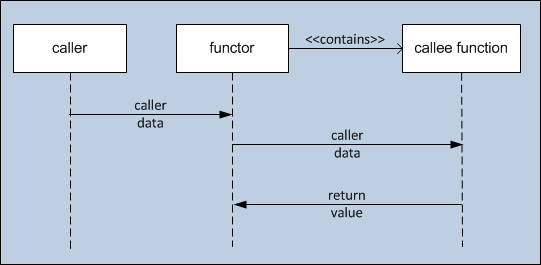When You’re Not Using a Return Value
The previous examples have used the function’s return value, but suppose we have a different caller that needs to call functions with one char argument, but does not use a return value. This routine is written to call a functor of type RWTFunctor <void(char)>.
NOTE: A routine that is not going to use the return value should never specify a functor that has one, to avoid limiting the functions the routine can access.
A functor without a return value, like RWTFunctor <void(char)>, can encapsulate a function with any return type. A functor that specifies a return value, like RWTFunctor <double(char)>, can encapsulate only functions with convertible return types.
Now suppose the callee wants to supply this function to the caller:
double function3 (char c);
A functor without a return value automatically ignores the function’s return value. The caller never sees it. In this case, the process looks something like Figure 48.
Figure 48 – Invoking a functor with no return value

Nothing different is required in the invocation. The caller calls the functor in the usual way:
functor3('y');
and the functor calls the function:
function3('y');





